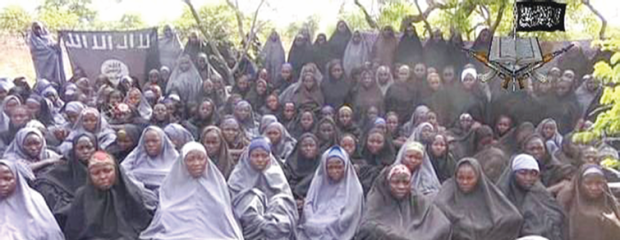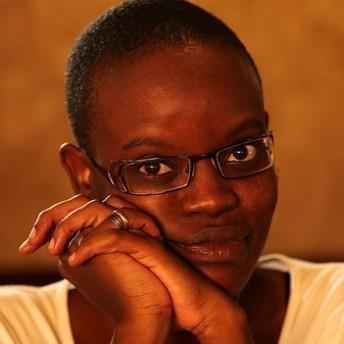Bringing Our Girls Back – By Elsie Eyakuze

 When the editor of this site suggested for my next piece (this one) that I try tackling the Chibok kidnapping, Boko Haram becoming a household name thanks to the #BringBackOurGirls campaign and mentioned Kony 2012 all in one email, the thin wire with which I keep my closet of inappropriate rage barely contained snapped. You can’t imagine how hilariously exhausting it is to be a committed pacifist with an anger management problem.
When the editor of this site suggested for my next piece (this one) that I try tackling the Chibok kidnapping, Boko Haram becoming a household name thanks to the #BringBackOurGirls campaign and mentioned Kony 2012 all in one email, the thin wire with which I keep my closet of inappropriate rage barely contained snapped. You can’t imagine how hilariously exhausting it is to be a committed pacifist with an anger management problem.
It turns out that what tripped me up was simply the use of the word ‘Our.’ Why the hostility, you ask? Because I was raised in the eighties and I bought into “˜We are The World’ and I have never handled disappointment well. This is about globalization, sovereignty, actively being African in the 21st Century and the long arcs of human history. It is personal. The fact is that when it comes to armchair activism, I am severely compromised.
The damage happened in the mid-2000s. I lived in the UK at the time, trying to study this discipline called ‘Development Studies’ at a nice school. Small classes, committed teachers, requisite amounts of left-leaning politics. And, importantly, people who don’t bat an eyelid when you tell them that you are from Tanzania. In fact, some might relate an anecdote of their own days cruising around the country post-independence doing something important with farmers or politicians or whatever.
One day a copy of Hubert Sauper’s film Darwin’s Nightmare fell into my hands. It is a compelling piece of work, quite intense, and in some ways duplicitous – which I know because I speak the Kiswahili that was ever-so-slightly mistranslated into inadequate English subtitles. Naturally it is banned in Tanzania because prostitutes, trafficking, street children, AIDS, corruption and racism are not themes that the Government of the United Republic would allow anywhere near its carefully curated international image.
And because I was in the process of falling even more irrevocably and intensely in love with my desperately complicated country, I was keen to show it off. I booked a room with a projector, spread the word, invited whoever was interested to come see a screening of Darwin’s Nightmare so that they could of see, feel, consider, think about, be moved by and enchanted and heartbroken by Her too.
When the film ended I thought we would sit in a moment of silence to consider the human condition and how unjust this world can be. Instead I was asked point-blank: “so, what are we going to do about this?” The audience trickled out, visibly disappointed to have wasted an afternoon watching a movie about people they couldn’t just, like, ‘fix’ because the organizer of the event didn’t have a campaign strategy complete with action points for them to attach to.
There is something about learning your place in the world, isn’t there? I watched them leave, wondering how on this sweet green earth these inexperienced children imagined they have a modicum of what it takes to ‘save’ anyone in Tanzania, having never even been there.
This is Africa we’re talking about, not a paint-by-numbers kit.
What happened was that I had just encountered the deep and unapologetic arrogance of developmentalism, and it was a shock. Suddenly coming from Tanzania wasn’t what I thought it was: just another thing, like coming from Myanmar or Colombia. No, we all have roles to play.
The lesson was reinforced a couple more times. I watched with amusement as students tried to bully then-president Festus Mogae of Botswana about the plight of indigenous people in Botwana during a speech he gave at the institution. He handled them like a consummate African head of state uninterested in being bothered. They ended up confused, routed and thoroughly condescended. I allowed myself to enjoy the moment.
And one evening, I sat in a pub next to a gentleman who upon learning of my nationality proceeded to regale me with tales of his colonial service, only to insist that the only reason a woman like me would be in the school I was attending was because my parents must be part of the kleptocracy. After all, no such thing as honest Africans who work long and hard to give their children an elite education, right?
Bojo! Clearly, this man did not know he was talking to a full-blooded Mhaya. And then he dragged my folks into it. Let’s just say that many of the principles by which I conduct my professional life and approach to international relations, class, the development industry, sprang out of those seminal encounters.
I haven’t hashtag brought back our girls yet, not because I don’t want these precious young women to be found and released and for their captors to be disarmed and routed. It’s because the fury hasn’t run its course yet. I hope it never does because it keeps me honest.
BringBackOurGirls is a great campaign, and I am awed and happy to see it succeed. It is changing the way things can be done; of course I am studying it. But I can’t be part of a remote-controlled effort to pressure the powers-that-be in Nigeria because I just don’t know enough about the players, the situation, the costs, the… everything. It wouldn’t be honest. It would be me, after a viewing of Darwin’s Nightmare, saying: “what can I do to save these poor people?” I haven’t even tasted their fufu. Where would I begin?
There can be no cool remove, no convenient attachment to principles or opportunities that allow me to ignore the intimacy of the act of ever helping anyone. No delegation, no armchairs, no hashtags that I can’t back up with depth and consideration. Our girls? Not until I can say it and mean it with respect and knowledge. This will not be a Kony 2012, Boko Haram is not a household name and there will be no encouraging of savior complexes on my part. Yes, I have been compromised.
Elsie Eyakuze is a freelance consultant in print and online media working mainly in the development sector. She blogs at mikochenireport.blogspot.com @MikocheniReport







So I get the whole rejection of foreign saviour complexes bit, but I’m puzzled as to why you are amused by a president disdaining criticism for his government’s dreadful handling of a minority group in his own country. By analogy, one doesn’t have to be Australian to condemn (past) government policy towards Aboriginals.
Maybe, I am daft. But can anyone explain to me how a rag tag group like Boko Haram, can kidnap our daughters, hold them hostage in a country with several battalions of soldiers, navy, air force. With millions of men? If the Niogerian arm,y is refusing to do it, how about the men in that country? Are we becoming wimps or what?
As for that nstitution called “Government of the Federal Republic”, the less said about this the better.
What is going on in Africa? Is it because these girls have no powerful families? I am running short of questions. Disappointed? Frustrated? Incapacitated? I am not sure which. But I am pretty certain that this continent lacks men of valour, else we would have matched on that thing called Boko Haram.
The Abduction of Innocent young [female] students and Boko Haram and the Cult of Gangsterism is indeed the “new face of terror” impaling Africa with intense anti-intellectual vigour.
The ‘Congregation of the People of Tradition for Proselytism and Jihad’—better known by its Hausa name ‘Boko Haram’ meaning ‘Western education is sinful’—is an Islamic jihadist and takfiri militant and terrorist organization governed by the gangsterism ethos without any credence to the serene intellectualism of the Islam Religion advanced by the Prophet Muhammad. Founded by Mohammed Yusuf in 2002, the Boko Haram organisation seeks to establish a “pure” Islamic state ruled by sharia law, putting a stop to what it deems ‘westernization sustained by crass colonialism’.
This Boko Haram cult of gangsterism evidenced in the violent abduction of young women from their schools must/ought be considered and regarded by all who value social order as being gangsterism in promotion of fear coupled with disregard for rule of law within society.. This abduction of innocent women reflects/refracts in the strongest lack of governance dialectic. These school girl abductions reinforce the gross lack of civil civic social order in Nigeria. President Goodluck Jonathan and his administration of governance must be held to strict account. These innocent young women were seeking only to improve their intellectual social standing grounded in learning in acquiring both academic and practical knowledge so as to enhance their personal lives along with enhancing and strengthening their society and culture in terms of prescriptive social civic civil cohesion.
The government of Nigeria has a fundamental obligation to eradicate this element of gangsterism shrouded within the veil of Islam using every and all national resources. Anything less must be considered as tacit compliance in accepting this pernicious cult of gangsterism who regard themselves as ‘law’.
Excellent article! True, revealing and disturbing. The height of this disconnect was reached when some cast members of Expendables 3 were photographed holding up paper banners with the now ubiquitous #BringBackOurGirls. It is as though anyone and everybody is pimping out the plight of these girls for the publicity it garners promising that this will sadly be another fad to be juiced and jettisoned after all interest has faded.
“Our girls?” Really?
Thanks for this article! It’s put into words so much of what I’ve been thinking about the ‘development industry’. I’m becoming increasingly disillusioned by our approach to combating poverty, conflict and some of the social ills that plague countries around the world.
I wonder whether we’ve over simplified but also glamourised the proces?
I’ve become suspicious of the intentions of foreign governments in their involvement as well as the motivation of aid workers on the ground. The whole saviour complex does seem to be an issue and how going ‘out’ to [insert ‘developing’ country here] has become the new fad. I squirm as I hear typically white middle class young people talk with about people they’ve ‘worked’ with as though they are objects!
Don’t get me wrong, I know people are genuinely concerned about what happens in other countries and have genuine compassion for people who are directly affected. I get and commend and encourage that. I just think there’s a need to change our approach; a need to re think remote control campaign which so interestingly discussed in this article, and the whole approach to development.
@MJ: Kaka, you make a good point.
What I enjoyed was the fact that the young activists got schooled at the hands of a seasoned politician. Nothing teaches like abject failure, and sometimes that is the point of exposure. Our modern culture’s insistence on instant gratification allows for mediocrity and excuses. This does not character make.
I very much approved of and respected their effort to tackle this authority figure, but they were young and the road to hell is paved with good intention. The praxis of social change is a martial art like any other.
The protesters were tackling Mogae on his home turf so to speak. They clearly hadn’t studied him, were unfamiliar with the habit of African Presidents to speak side-ways when annoyed by pesky students, got in-depth with the issue. He tripped them up on technicalities such as “we don’t call them Bushmen, they are San and Khoi-San.” Too easy.
I think of it as the “come correct” principle. If you’re going to take on an issue, do the work. Study your opponent, find your effectiveness, make it about smart effort rather than appearing to succeed at something you clearly don’t have enough time to commit to beyond the immediate, compelling and perhaps ultimately narcissistic “hey I spent an afternoon doing this” approach.
And the reason am not even going to touch the plight of Aboriginals in Australia (to be honest, I would rather use the collective self-name they have for themselves and I don’t know it, to my shame) is because I’d have to delve into the “empty lands” mentality of British colonialism and what it has done to… yaani. Who has time? I have deadlines, and my anger management problem, to deal with.
I don’t know why we got so lucky on this continent, but unlike other unfortunate native folks we’re just too fricking hearty to kill off with booze and diseased blankets or opium trades or just about anything else.
I dwell on the side of the Hadzabe and everyone else who isn’t interested in being forced to modernize hivi hivi. Watched the movie about the rabbit fence. Read about the plight of Amazonian kings trying futilely to protect their people. Et cetera. You just won’t catch me hashtagging about it until I can come correct.
It’s not even about foreign interventions or whatnot. It is about coming correct.
I haven’t hashtagged to bringbackourgirls yet, but I do think that hashtagging or whatever the next fad will be, sometimes leads onto other things, like causing necessary shifts in public opinion, pressuring governments to act etc., which in Africa’s case, can make a huge difference, given the general indifference to the populace shown by African leaders (remember the AU called an extraordinary summit to discuss the ICC indictment of sitting African presidents, and exactly zero, in the wake of the abductions- in fact, western leaders have expressed more concern ove the girls than have african leaders)
So, I do not think these gestures are wholly empty and while the hashtag is not the smoking gun, it is part of many actions (hopefully) that will cause the necessary ripples needed for change in these places. How sure are you or I, that these girls would have remained headline news around the world without this hastag campaign? (remember, this is Africa we are talking about) And what about the schoolgirls of Northern Nigeria? do they not find encouragement in the fact that the world is showing solidarity with them right now? I know, the tool is clumsy, but is it not better than deafening silence?
I understand the neocolonial condescetion to which you allude, and I too, have had encounters of my own(I could write a tome!), but at the same time, I feel there are times that actions, however immediately blunt, are more about humanity trying to assert itself, and less about the west condescending to us, Africans.
I don’t know if this example is a good one, mind, because the hashtag campaign originated in Nigeria and spread all over the world, notjust the west – even if the news, as ever, focused mainly on the ‘doing-good’ west in this regard.
Remember, it’s not that long ago that the world was accused of standing by and watching while Rwanda happened.I do not think there are easy answers one way or another. It’s certainly not all black and white. I believe the truth lies somewhere in the grey area in between, and while I won’t hashtag – I find social media scary in general, for giving the illusion of being personal while exactly the opposite- (and a really do prefer to be forgotten, even when I’m doing good!) I’m not necessarily going to ascribe “attitudes” to those who do. We live in our times at the end of the day, it is what it is, and if the hashtag sheds a light on a human tragedy or shames some intransigent African leader to action, so be it!
@Mwalinafiki: mh, yes. you are right on many points, especially the one about letting indignation (pride?) get in the way of things. a typically African President tactic that clearly has been absorbed by some of us. Heh. Thank you.
Well written piece. One disturbing thought is that the author sympathises with the concentrated misery peddled by Darwin’s Nightmare. I too saw the film and my first thought is hey, I can do the same film in London, Paris, New York etc. There is suffering and inequality everywhere in the world, but we Africans seem to be the only ones allowing foreigners to construct these tragic operas as if only they can and should ‘sort us out’. Why indeed be surprised now that the whole world is making the Nigerian girls their business? Decades of condencesion has caused some sort of passiveness on the continent. Look at the ‘Mfadhili’ culture in Tanzania…..what happened to integrity and self motivation? The ‘save-poor-Africans’ stance has affected us more than it pats the Western ego on the back. By the way, sooner or later we all must stop differentiating ‘us’,,,’them’,,,It is up to you modern youth to show us the way. We, analogue dinosaurs are limited by time in what we can do. Make 21 century different. Glue back the human story into ONE.